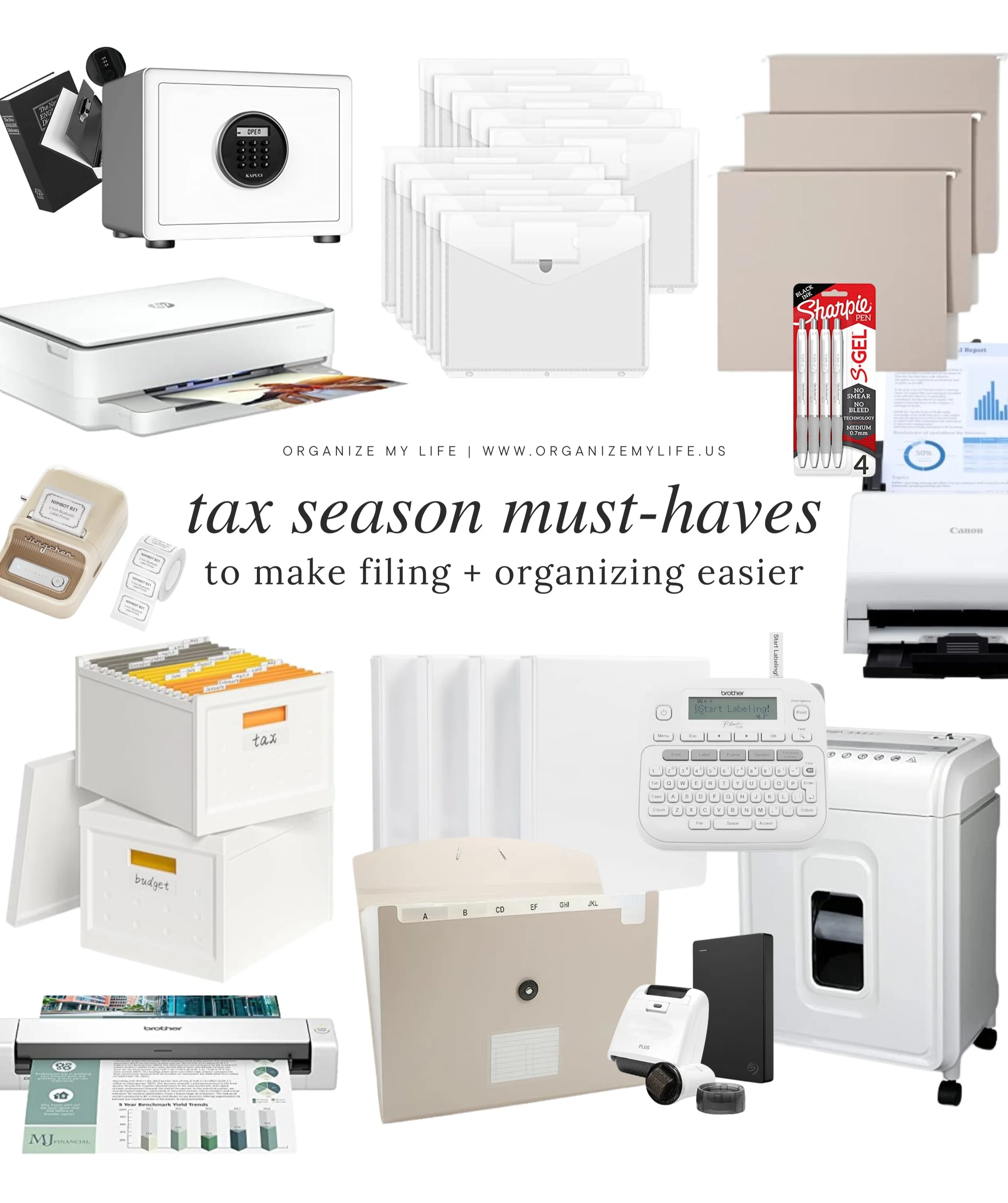My No-Fail, Super Simple Guide to Organizing Your Taxes (Yes, It's Possible!)
It’s officially parallelogram tax season. But seriously, why didn’t they teach us this in school?
Let me paint a picture for you: It’s way past midnight, the house is silent except for the occasional snore from my sleeping husband (bless him). I'm surrounded by a sea of scattered receipts, lengthy legal tax forms, and half-empty coffee cups, as I hunch over my bed with my dimly lit computer as my only source of light. While Google searching intimidating tax lingo and triple checking that I typed in the correct information, I remember squinting at the screen half-convinced that if I got one number wrong, my next fashion statement might be an orange jumpsuit (and trust me, orange is NOT my color).
When it came to tax season, this was me for years!
Well, until I decided, enough was enough. Caught in the whirlwind of my annual mini-meltdown, I realized something had to change. I was tired of feeling like I was drowning in documents, helpless, and spiraling without a way forward. I was determined — No more late nights, no more stress-induced coffee binges. I was going to create a streamlined tax prep system that I could reuse year after year that didn’t make me sacrifice my sanity or my precious sleep. (Spoiler: I did!)
And since sharing is caring, I'm here to sprinkle a little organizational magic into your life, so you too can go through this taxing season (pun intended) with more ease and sense of control. Regardless if you’re team “Do-It-Yourself” or team "Let the Pros Handle It,” I want to make sure that next year, you're sitting pretty with a stress-free tax system that works for you.
So, in the spirit of not gatekeeping (because who needs more of that in their lives?), here's my guide to turning tax time from frantic to fantastic.
Creating Your Tax Organization System:
1. Keep it Simple Silly:
Start with a simple filing system. Get yourself a cute accordion folder, sturdy three-ring binder, or storage box to hold all your tax documents throughout the year. Click here to see my favorites!
If you prefer going all digital instead, open up a new folder on your computer or cloud storage and clearly label it with this year’s tax season. Make sure to keep your method in a place that is safe and secure, but equally as accessible, so it’s not a hassle to reach throughout the year.
2. Label Like a Boss:
Inside your go-to filing system, use folders or built-in tabs to label categories that apply to you and your life — think ‘Health Expenses’, Work Receipts’, ‘Investments,’ ‘Charitable Donations’ and so on. Check out my go-to label makers here.
Apply the same system to your digital folders, if you’re forgoing the paper system this year. Scan or download digital statements, receipts, and forms throughout the year. Use the current tax year and document type to clearly name each file.
3. Don’t Delay, Put It Away:
As documents come in, file them (or scan them in) immediately. This small habit prevents the year-end paper avalanche.
Need a scanner recommendation for all your digital filing; find them here!
For the repetitive filing throughout the year, if this applies to you, set a date each month (maybe over a cup of your favorite coffee, tea, or wine) to file or scan away receipts, bank statements, and other tax documents. This will save you a marathon session come April.
4. Going the Extra Mile:
Make a Tax Calendar: Note down important dates like when W-2s or 1099s should arrive, quarterly tax payments, or any other deadlines relevant to you. Stick it on your fridge, set it in your phone’s calendar, place it inside your filing system — just somewhere you’ll see it often.
Make a Checklist: A simple checklist can be a lifesaver. List out all the documents you need to gather for your taxes. As they come in, check them off. Easy peasy.
Stay Informed: Tax laws change, and staying updated can mean more savings and less stress. Subscribe to a tax newsletter in your state or check in with a tax professional periodically.
5. Wrapping it Up:
After filing your taxes, store your past tax returns in clearly marked folders and place in your attic, basement, or external hard drive (for all my digital pals). You should keep these records for at least three years, but some experts suggest seven.
The Nonnegotiable Step for Tax Experts:
When it comes to the filing system you used this year…what worked? What didn’t work? Is there anything you can add, do, or change to make this process easier for next year? Ask yourself these questions annually and adjust accordingly.
The purpose is to start simple. Then through learned experience, make adjustments. Once you find your rhythm, duplicate your system each year, and it’ll become second nature.
Bonus Tips for Working with Accountants:
Ask for Their Preference: Some accountants love digital files, while others prefer paper. Ask in advance and tailor your organization to their liking. (Ask them for a checklist!)
Communicate Clearly: Keep the lines of communication open with your accountant throughout the year, not just at tax time. Trust me, they'll love you for this, and it might even save you some dollars in billable hours!
Question Queue: Keep a running list of questions for your accountant. This way, you won't forget to ask about that mysterious tax credit you heard about in passing.
[Explore my favorite tax prep, filing, and organizing systems for both digital and paper lovers.]
And remember, while the Pythagorean theorem might not be saving us any dollars today, an organized tax system definitely will. So let's raise a cup of coffee (or tea, no judgment here) to conquering tax season with style, sanity, and a system that works year-round!



